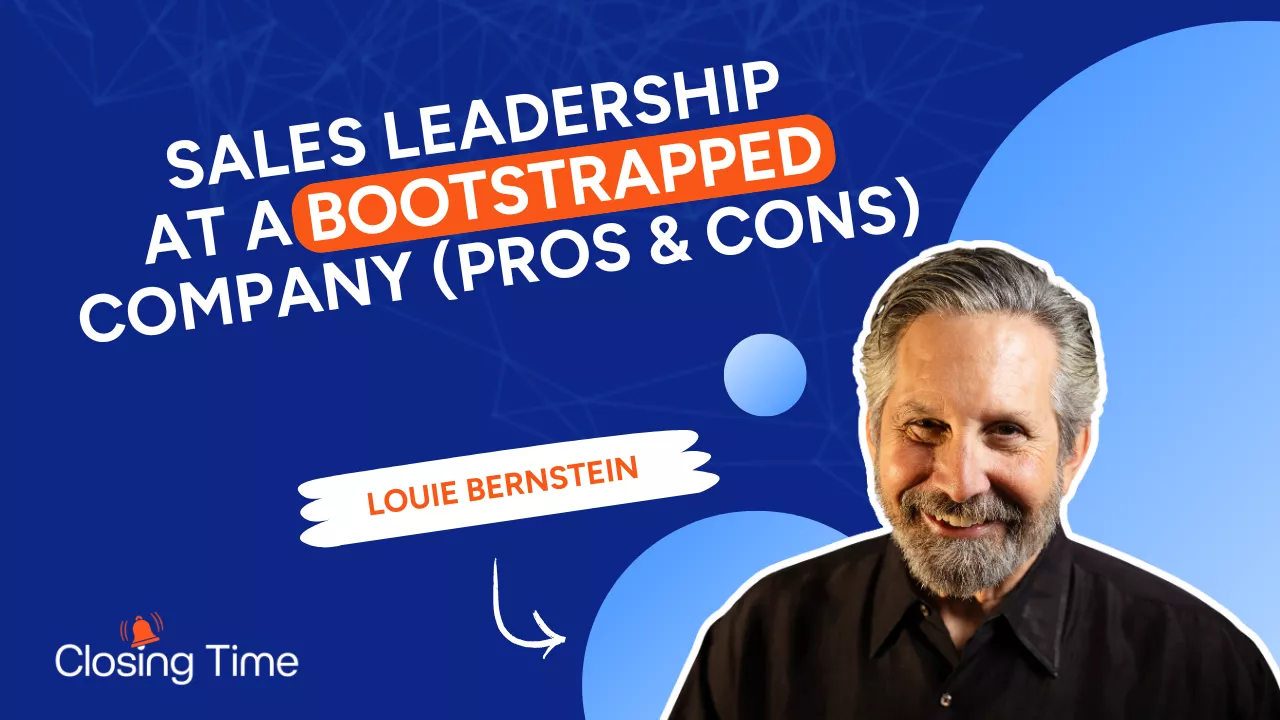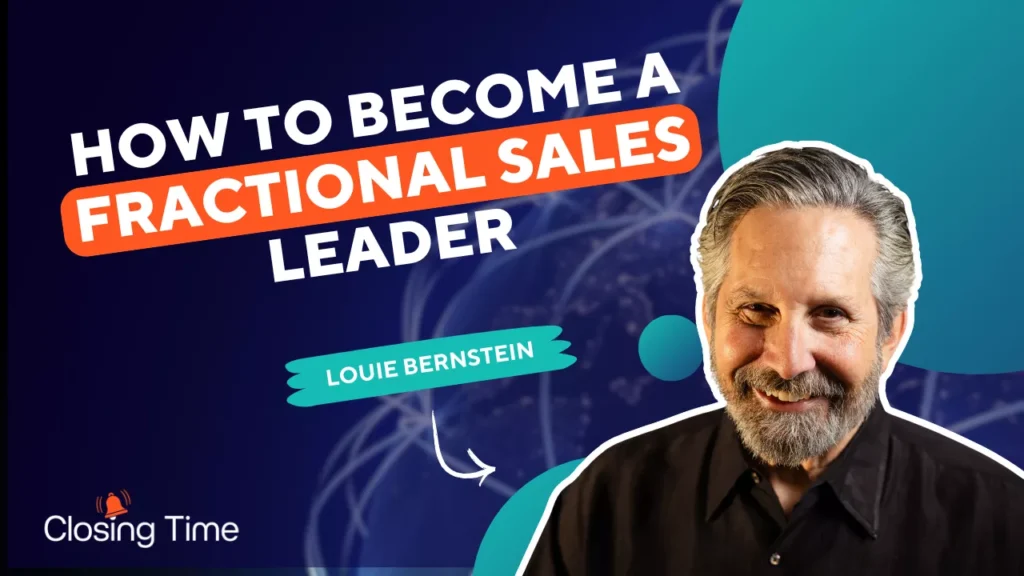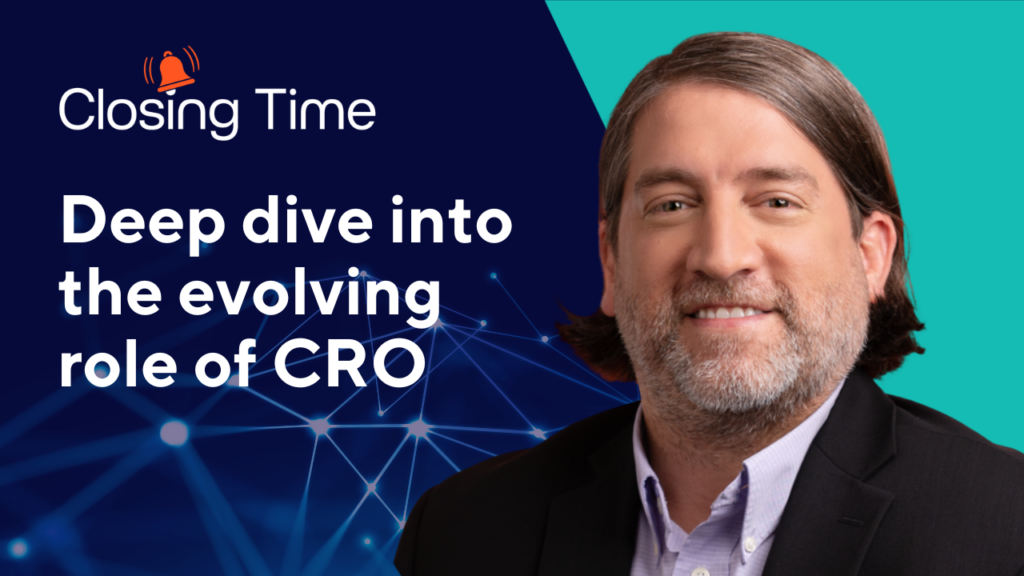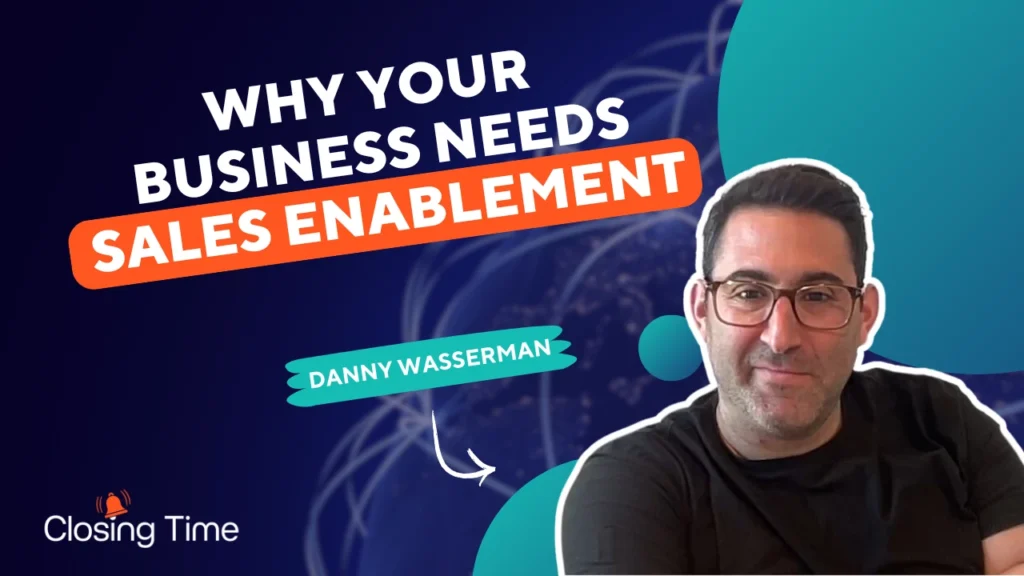Got a job offer from a bootstrapped company.
We’ll help you weigh the pros and cons of working in one,
in this episode of Closing Time.
Thanks for tuning in to Closing Time, the show for go to market Leaders.
I’m Val Riley, head of marketing for Unbounce, Insightly and LeadsRx.
Today I’m joined by Louie Bernstein.
He is a fractional sales leader and a top voice on LinkedIn.
Louie, welcome back to the show.
Val thanks for having me. It’s nice to be here again.
Well, we don’t get too many repeat offenders,
but we enjoyed our conversation with you so much, we decided to bring you back
on another topic that I feel like you have a great deal of experience in.
And that’s talking about bootstrapped businesses.
So we’ll I’ll kick us off with a definition in case anybody out there
isn’t familiar with what a bootstrap business is, Google defines
it as unfunded, being the keyword the business was started
and has grown
using the founders own resources and revenue generated from the company
rather than relying on external funding like venture capital or loans.
And it’s estimated that 70 to 80% of businesses are bootstrapped.
So let’s get you involved in the conversation here.
Can you talk about
some of your experiences and working with bootstrapped companies?
Well, I choose to work with, bootstrap companies
because I was one, and I.
You know, I started my company.
I wouldn’t say I didn’t have investment.
My parents loaned me $5,000,
to start, and in 1986.
And that was a lot of money in that.
And I spent probably three quarters of it on rent
and a printer and, you know, things like that.
So, I would still consider myself, bootstrapped.
But to me, bootstrapping is an attitude.
You know, bootstrappers are people that, have an idea
they don’t want anybody telling them what to do.
A fault of mine, they they, you know, they have an idea.
They want to run with it.. Get out of my way.
Going forward.
Whereas, you know, VC backed companies,
you know, a lot of people involved,
your options as the founder CEO can be limited.
But my experience with bootstrapped founders, I
if you even if you looked at my LinkedIn profile, that’s all I do.
You know bootstrapped founders startups to 5 million because that’s what I know.
You know that’s what my expertise is.
And that’s the truth is that’s what my heart lies helping people.
Because I know what I went through to build a business.
So I think a great structure for our conversation today would be maybe
talking about some of the downsides of being hired into a bootstrapped business,
and then maybe some of the positives.
So when I think about the downsides, like, let’s say you’re a sales
or marketing leader and you’re being hired into a bootstrap business,
I think one of the big things is you might not be fully staffed.
Yeah. Yeah. Well, you
know the kind of ties to another subject
about when you hire a salesperson or a sales leader.
They have to be the right fit.
If you’re if you’re a, seven person, ten person
company, you don’t want to hire somebody from IBM.
I mean, it just doesn’t work for those type of salespeople.
Says leaders are using lots of resources and collateral and support
and all these things,
and they’re going to come and expect that from your little company.
And it doesn’t work that way.
Everybody in a small company, whether you’re sales
support, marketing, everybody does everything.
If the windows need washing, you know, you get up and you you start to do it.
And I’ve lived that.
So your expectations when you go to a bootstrapped company,
if you’re going to do that, understand
that it’s not all going to be laid out for you.
Things are going to be developed along the way.
The good news is you get to have a hand in doing that.
Before I started my company,. I went to work for a small company
because I was in a big company just to learn how to run a small business.
I tried to learn on somebody else’s dime, and of course that, you know, that
that small company was EMC and I was employee number 56.
But, I got the benefit of learning that.
So prepare yourself for what you’re getting into is what I would suggest.
Yeah, absolutely, I love that.
I feel like you have to be very scrappy
when you’re working at a bootstrap business.
I think, like you were saying, you know, you you have to do what has to get done.
And there might not be processes around those things.
And you build processes as you’re going.
So as part of not being able to hire,
you also might not be able to spend at a rate to fuel growth,
but I think that might be like a blessing and a curse at the same time.
Right.
Because that reckless spending
that we had and maybe that growth at all costs era.
You know, it can be fun, but I think when you’re being more
thoughtful with your spending, it really forces you as a leader to like,
you know, dig deep and think more about every step you’re making.
Because this is the founder’s money.
This is the profits from the business that you’re spending.
Right.
Well, there’s that expression.
You get more creative the broker you get.
And it’s true.
you have to be careful with every penny that you spend.
You know, it’s a real dichotomy.
You want to.
You want to grow, but you have to be careful.
So you scrutinize every decision.
I mean, I truly believe you can’t cut your way to success, but,
you know, you do have to be very careful about where
you, do make the investment.
And, and sales and marketing is just one of those.
Each salesperson you bring up is very important,
and they do have to pay for themselves
eventually, because you can’t be, wasting your money.
I will say, though, in the smaller, companies up
for word of advice that I would give any of the bootstrap founders
is before you hire your first salesperson or sales leader manager.
First of all, I suggest hiring two at first, not not just one,
because if one quits, you’re back to where you started
or in two, and you may find your next sales manager there.
But, before you hire them, make sure that you have your go to market
strategy, cold your ICP cold and that you’ve done it yourself.
You’ve shown success.
You’ve proven go to market strategy.
You’ve proven that your ICP is indeed your ICP.
And they bought you showed it, and you started to put
what you’ve done into the sales playbook.
So now, because time is money and it’s crucial,
by the time you do bring on your new, sales people,
you’re, you have a foundation and you’ve got a somewhat
proven system that they can jump in and be productive quickly.
Yeah, I think also. There’s it.
It’s got this feeling of a different level of accountability.
When you’re looking at the eyes of the founder owner and saying,
I need to hire two salespeople, versus if you’re talking about spending a VC
or private equity money on hiring two salespeople, like that,
talk about how the dynamic of that is just slightly different.
Well, to the VC, they just go off and hire,
you know, because, you know, we got the money, we got the formula.
We’ve done this before.
And so just just start hiring and, you know, we’ll try to hire the best.
And you typically go through several iterations
and, you
know,. I’ve had my experience with that as well.
I went to work early on.
Well, after I sold my company, took some time off, and then I went
and work for a couple of startups to help them along.
And one of them, we did really well for about two and a half years.
Grew it organically.
No investment,
I think 17,000 to 3.5 million over a two and a half year period or so.
But the founder wanted big, wanted to grow big, wanted to be a unicorn.
So he went and got some VC money, and I think we brought about three or 4
or 5 million bucks, and they fired him within 90 days and he was gone.
And then they fired me too.
So we’re all gone.
And so be careful.
I can if you’re the founder and you say,
I got this,. I just got to go get some money.
Just be very careful, because, yeah, you have the dynamics of growth
at all costs.
But you also have the perils
of, turning the reins over to, to somebody else
and back to your other, thought about, you know, the strategy.
If you’re a bootstrap founder,
you have to have the the mentality of playing the long game.
It won’t happen as quickly.
You may get sales, but at what cost?
So you’re, you know, and the hardest thing, especially
for founders, bootstrapped people, including myself, is patience.
I don’t have patience.
Most bootstrapers don’t have patience because they don’t have time.
You know, they they have limited resources and limited money.
But somehow you’ve got to develop your patience, play the long game,
try to make a smartest investment is you can build a culture.
And, you can end up building a real good long term business that’s yours.
So I love that you mentioned culture.
Because I wanted to shift gears to some of the positives
about working at a bootstrapped company.
And I think culture just comes to mind very quickly.
That feels like there’s this “we’re all in this together” attitude
when you’re when you’re on a team that’s bootstrapped.
Have you experienced that feeling?
Because that’s what what resonates with me in the times in my life
where I have worked for a bootstrapped company.
Yes and no.
So, yes, if it’s done correctly,
part of the problem is that in small
companies, bootstrap companies,
it starts to feel more like a club than a business.
And everybody feels that they have the right to make the decision
and the final decision, and it doesn’t really work like that.
The social culture is important.
I once had a my best salesperson, and I had a fire
because she was creating so much chaos.
It was killing our culture.
Long story short, after she was
gone, sales picked right back up and got even better.
And so the effect of just one, person on
the culture can have a a big effect.
But you have to balance that with still running it
like a business where everybody stays in their lane.
And the final decision is made by one person.
So the company as a whole can move forward.
Yeah.
Let’s talk a little bit about decision making,
because that’s definitely one of the benefits of working
for a bootstrapped company is that decision making can be very quick.
And direction setting because it comes from the founder.
And you don’t have to go through an investor or a board.
So it feels like the business can sometimes move a little bit faster.
Absolutely.
was really one of my impetus for going to business for myself early in my career.
Maybe my first technology sales jobs were a big computer company,
now 30,000 people.
And I was working on a deal one time as a salesperson
at a company here in Atlanta, coming down to the finals,
me and one of my competitors and says, you know,
I like yours, better, but you’re about 10% too high.
Just match the price. You could do it.
I knew we had the flexibility.
I said, no problem. I’m ready to go.
I went back to the office, went to my manager, said, great news.
We got a deal.
All we gotta do is match the price and they’re going to go with us.
And he said to me, wonderful, let me go talk to, regional management.
They’ll set up a meeting with the district manager.
We’re going to pass finance and we’ll get credit involved.
I said, Hey, how long is this going to take?
Oh, no more than 2 or 3 weeks.
I said, what are you talking about?
Do you want us to sign today?
And so there’s there’s the difference.
I mean, decision making.
You know, you’re a small guy.
That sounds great.
Here it is. Go get the order.
Whereas in the big company, you know, I don’t know what the deal is.
They just.
It’s not for me.
It could be for some people.
They could go at that pace.. But it wasn’t for me.
Yeah.
Similarly, I’ve been in experience where, a VC firm or a PE firm.
You know, they’ll put some data on a spreadsheet
and they’ll say, well, if you did, you know, X with Y, then you can do,
you know, A with with Z, you know, and, and I think about that
and I from their perspective, boy that makes perfect sense on a spreadsheet.
But in the day to day operations of this business that does not make sense at all.
And, and sometimes I would struggle to communicate that because they’re not,
you know, your founder, your your investor is not feet on the ground.
Yeah. Well, right.
And probably the majority of them never started a business from scratch.
they go by math, they go by spreadsheets the VCs.
And that one example. I gave you where we took in money,
was talking to one of the investors
one day, and I said, well, how do you know if this is a success?
And he said to me, and I never forgot this.
He says, we’ll invest in ten companies.
We know seven are, you’re going to lose money, two are going to break even,
and one’s going to hit a home run.
And we don’t care which one,
you know.
So have at it, you know, we’ll we’ll figure it out along the way.
And that’s kind of that spreadsheet business plan that you’re talking about.
They just run the numbers.
And if your number comes up, woohoo, if it doesn’t, that’s the way it goes.
Yeah.
That distance, I think, from the everyday operation of the business.
Sometimes, you know, really can,
create some dissonance when you have funding.
I remember
I worked for a bootstrapped company, and we were just a little bit short.
You know, we
we saw some contracts coming in, but they weren’t
going to come in for a few months.
And the leadership team went to the company and said,
hey, here’s what’s happening.
We had I think, 60 employees.
And we said, hey, if would you if anybody would be interested
in volunteering to take,
a Fridays off for the next, you know, three months
and reduce your pay by 20%?
That would bring our payroll down to a point
where we can make it through this slow period
when these other contracts are going to come in, and about
75% of the employees raised their hand and said, I will take a 20%
pay cut for the next few months to keep this company going.
Because the alternative was, you know, obviously a riff of some kind
and that spirit,. I just remember feeling so,
like I was a part of something larger, and I just don’t think
you get that same feeling from a, like, a VC or PE backed company.
No, no, you don’t get that feeling because it’s not there.
Similar story in my consulting business.
During one of the four recessions
that we went through, all my consults the way we would,
give out jobs, consulting assignments was based on seniority.
Who’d never been there the longest would get the job.
That that’s how it was.
I think it was the first or second recession, and things got tight.
I said, look, and I said that the people have been the longest.
I said, would you be willing, even though you’re up next,
be willing to skip it, turn, let somebody else get it
so we can keep the group as a whole.
And nobody had a problem with it.
with a VC, you’re in your mindset if you’re an employee
and they get the money, it is put millions in this company, but they understand.
And, in a small bootstrapped business, it’s just not like that.
Yeah, 100%.
So, one final thought. If if you’re.
If somebody has an offer as to be the head of sales
at a bootstrapped company, and perhaps they’ve only worked
at funded companies or publicly held companies up until this point,
how would you advise them to deal with that job offer?
Well, before before they get the job offer,
they should have had the questions answered.
Regarding resources and goals and what’s expected of you.
What are my list of accountabilities?
What type of support will I get?
And, you know, just if it’s not, it’s not, you know, but
whatever it is, you should know what you’re walking into.
So I my advice to so on having been offered
that job should have done your homework during the interview process
and ask a lot of questions.
It’ll it’ll do two things.
It’ll clarify in your mind if you are the right candidate for the job.
You know, it’s your decision to whether or not you want to accept it,
once it’s offered and and and then decide, you know,
if this is the kind of environment you want to be in, but you’ll know
on the front end, no regrets going into it on the back end.
Right. So reviewing those negatives.
Reviewing those positives and then, you know, making the best decision.
Louie, thank you so much for coming back to closing time.
Are you still doing the Sunday starter.
Is that a great place for people to get in touch with you?
That’s great.
I mean, I, I think this week will be my 174th consecutive Sunday starter.
That’s a LinkedIn newsletter.
And you can find it on my profile.
And interesting enough, the one that’s coming up
this Sunday is about resilience and resilience in business.
And I why if you don’t have it, you’re doomed.
How to get it?
And, hopefully it’ll help one of your, watchers, podcaster.
A great topic for sure, whether you’re
whether your business is bootstrapped or funded.
Everybody needs a little dose of resilience.
Thanks so much, Louie.
We appreciate you coming back and thanks, all of you for tuning into Closing Time.
Remember, you can get this episode delivered
right to your inbox if you click the link in the show notes.
We will see you next week.




